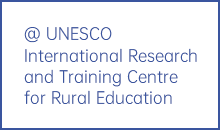In the summer of 2021, UNESCO International Research and Training Centre for Rural Education (INRULED) developed a summer course on "Gender Equality and Rural Revitalization" for undergraduates at Beijing Normal University. The second lecture was delivered by Zeng Xiaodong, Executive Director of INRULED and Professor of Beijing Normal University, on the topic of “the Evolution of Development in International Perspective: Theory and Practice”. The summary is presented below to welcome all to join us in the discussion on development issues.
In this lecture, Professor Zeng Xiaodong focused on the topic of "Development" and followed the progressive logic, from identifying topics, introducing key concepts and theoretical frameworks, explaining indicators and strategies, to sharing specific development practices. This lecture aims to draw students' attention on development issues and institutions, familiarize them with basic development theories, and help them understand the conceptual framework underpinning the development practices. The course also includes study tours into public welfare institutions and rural societies, hoping that students can pay attention to the social development issues with an interdisciplinary development perspective.
Development issues: identifying topics
The issue of development carries an international conceptualization. Phenomenon including the political conflicts in Korea, the social reforms in Japan, the military revolutions in Russia, the social disorder in Central Asia, the land reforms in India, etc. are all related to the topic of development. As the development practices are deepened, the concept of development has been constantly updated and enriched.
Evolving concepts and theoretical framework for development
At the early stage when the development theory came into being, human beings had just gotten rid of the World War II and the crucial task was to boost economic growth. At this stage, the Harrod-Domar Model, Vicious Circle of Poverty and the Big-push Theory became the representative development theories and models.
In the 1970s, the over-emphasis on economic growth brought about a series of social issues such as excessive gap between the rich and the poor and the social disorder. At this time, the modernization theory began to prevail. Also, the connotation of development began to go beyond economic growth and emphasize the political and social dimensions of modernization.
In the 1980s, a series of problems again emerged such as the debt crisis in South America, which led to a rethinking and criticism of the Western-dominated development model. Scholars from Latin America put forward the Dependency Theory, emphasizing that development requires independent status.
Since the 1990s, the human-centered concept of development, which emphasizes personal development and freedom, has become accepted and recognized. Amartya Sen's Capability Theory and the Sustainable Development of UN embody the human-centered concept of development.
Professor Zeng pointed out that countries adopt different development logic in different periods. For example, in the early stages of development, the emphasis was on economic growth. Although it may lead to political conflict and social disorder, it might be an inevitable pain throughout the path to development. Also, we need to identify the logical framework behind them in order to better understand the development practices.
Indicators and strategies for development
At the stage of promoting economic growth, development indicators are mainly centered on the total amount, like GDP, GNP, etc.. At the stage of modernization, the economic input experienced a shift in focus to education, welfare, social, etc., and the structural indicators began to emerge, such as the Gini Coefficient. In the context of human-centered concept of development, the comprehensive, multidimensional and efficiency indicators are advocated, such as Sustainability Indexes, Human Development Index etc..
Development practices
As the understanding of poverty and development deepens, diverse development practices expand the boundaries of human cognition. For example, Muhammad Yunus, laureate of the Nobel Peace Prize, set up the Grameen bank and provided small loans to the poor, aiming to achieve their localized development. Angus Deaton, laureate of the Nobel Economics Prize, pointed out that we need to escape from the extreme poverty. What is the right path to the development? We hope that students could examine the diversified development practices from the cross-disciplinary perspective and find solutions to address the development dilemmas in practice.
Development is an essential issue for all. As an organization aiming to promote rural development through education, INRULED hopes that more people could join the cause of rural development and identify new ways to promote development via education.













